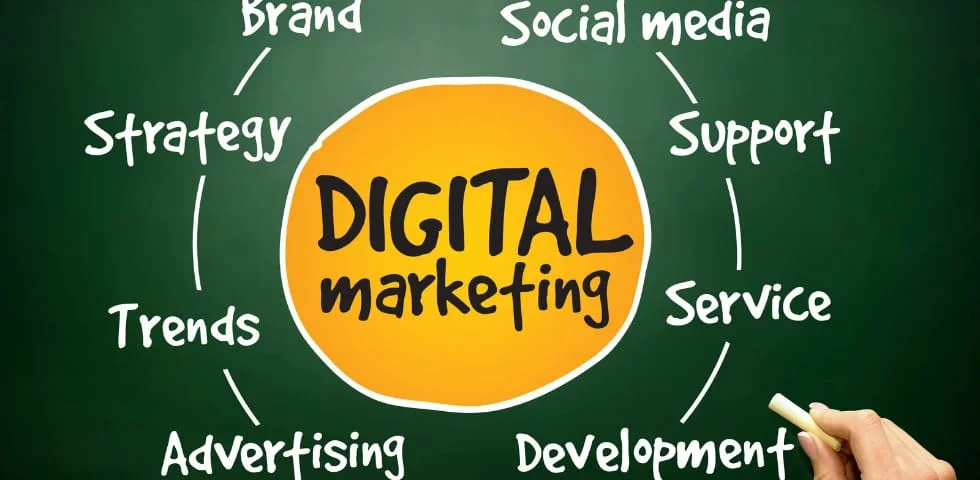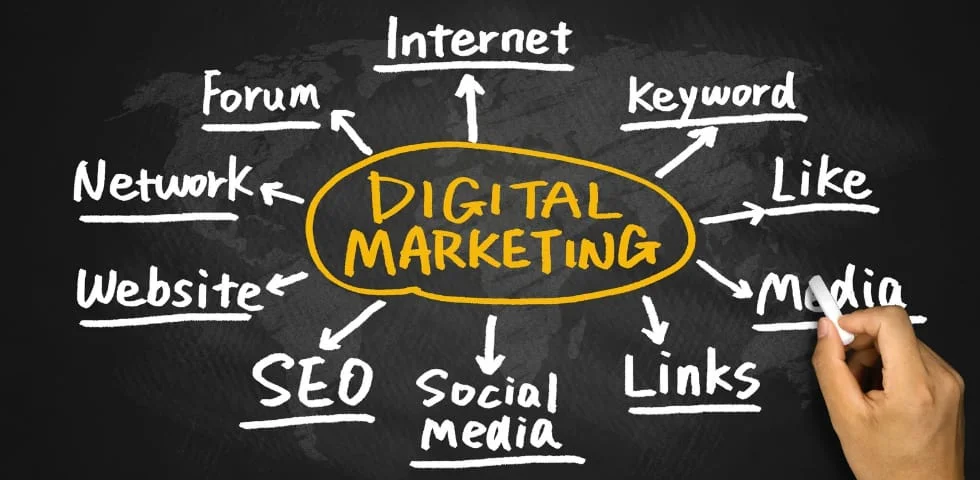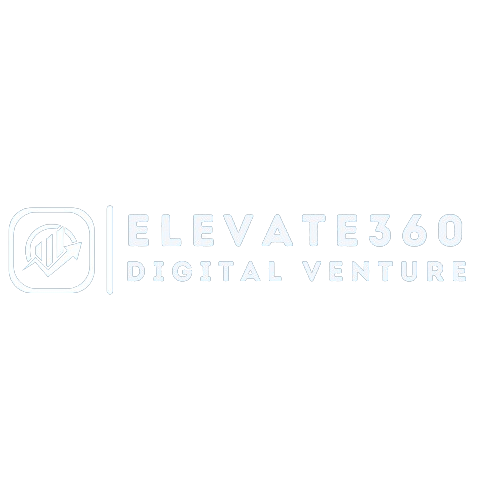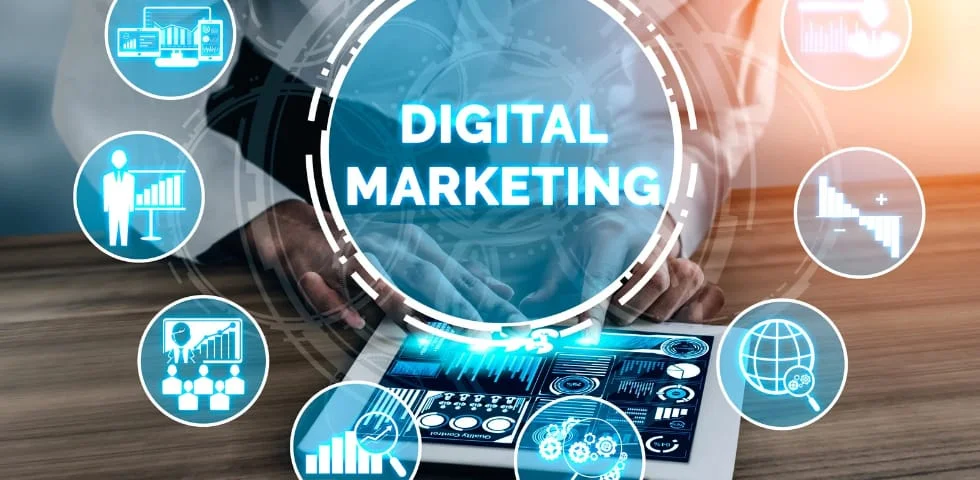Introduction
Digital marketing is no longer just a buzzword; it’s a critical component of any successful business strategy. Did you know that over 4.9 billion people use the internet daily? This massive online presence underscores the importance of digital marketing in reaching and engaging potential customers. Whether you’re a seasoned marketer or a small business owner, understanding digital marketing’s intricacies can significantly impact your business growth.
Digital marketing has evolved from simple banner ads to a complex ecosystem encompassing SEO, social media, content marketing, and more. It’s no longer sufficient to merely have an online presence; businesses must strategically engage and convert their audience through various digital channels.
In this comprehensive guide, we will explore the significance of digital marketing, dissect its key components, and provide actionable insights to help you craft a robust digital marketing strategy. By the end of this guide, you’ll be equipped with the knowledge to navigate the digital landscape effectively and leverage it to your advantage.
Understanding Digital Marketing

Definition of Digital Marketing
Digital marketing encompasses all marketing efforts that use an electronic device or the internet. Businesses leverage digital channels such as search engines, social media, email, and other websites to connect with current and prospective customers. Essentially, any form of marketing that exists online falls under the umbrella of digital marketing.
Difference between Traditional and Digital Marketing
Traditional marketing methods include print ads, billboards, television, and radio. While these channels are still relevant, their reach is limited compared to digital marketing. Digital marketing offers a broader scope for interaction and engagement with a global audience. It allows for real-time feedback, precise targeting, and measurable results, making it a more dynamic and effective approach.
| Traditional Marketing | Digital Marketing |
| Print ads | Social media ads |
| Billboards | SEO |
| TV and radio | Email marketing |
| Direct mail | Content marketing |
Current Trends and Statistics
Digital marketing is a rapidly evolving field, constantly adapting to new technologies and consumer behaviors. Here are some current trends:
- Artificial Intelligence (AI) and Machine Learning: These technologies are revolutionizing how marketers analyze data and predict consumer behavior.
- Voice Search Optimization: With the rise of smart speakers, optimizing content for voice search is becoming crucial.
- Video Marketing: Videos are more engaging and have higher conversion rates compared to other content forms.
- Interactive Content: Quizzes, polls, and interactive infographics are gaining popularity for their ability to engage users.
Statistics:
- Over 90% of consumers check online reviews before making a purchase.
- Companies using digital marketing strategies have 2.8 times better revenue growth expectancy.
- Content marketing costs 62% less than traditional marketing and generates about 3 times as many leads.
The Importance of Digital Marketing in Today’s World

Why Digital Marketing Matters
Digital marketing is vital for businesses of all sizes. It offers numerous advantages over traditional marketing methods, including the ability to reach a wider audience, interact with customers in real-time, and measure the effectiveness of campaigns. Here’s why digital marketing is essential:
- Global Reach: Unlike traditional marketing, digital marketing isn’t bound by geographical limitations. A well-crafted digital marketing campaign can reach a global audience at a fraction of the cost of traditional marketing.
- Cost-Effectiveness: Digital marketing offers a more cost-effective solution compared to traditional methods. Techniques such as email marketing, content marketing, and social media marketing provide high ROI (Return on Investment).
- Measurable Results: Digital marketing allows businesses to track their performance and measure the success of their campaigns through analytics tools. This data-driven approach enables continuous optimization.
- Targeted Audience: Digital marketing enables precise targeting based on demographics, behaviors, and preferences, ensuring that marketing efforts reach the most relevant audience.
- Enhanced Engagement: Interactive elements of digital marketing, such as social media and email, allow for direct interaction with customers, fostering stronger relationships and customer loyalty.
Impact of Digital Marketing on Businesses of All Sizes
From startups to large enterprises, digital marketing levels the playing field, allowing smaller companies to compete with larger ones. Here’s how digital marketing impacts businesses:
- Startups and Small Businesses: These businesses benefit from cost-effective marketing strategies that generate immediate results. SEO, social media marketing, and content marketing help build brand awareness and attract new customers without significant investment.
- Medium-Sized Businesses: They use digital marketing to expand their reach, enhance their brand image, and engage more effectively with their audience. Email marketing and PPC campaigns are particularly effective for these businesses.
- Large Enterprises: For big companies, digital marketing is essential for maintaining brand presence and staying competitive. Advanced strategies like influencer marketing, AI-driven analytics, and personalized content are commonly used.
Digital Marketing in Various Industries
Digital marketing’s impact is felt across different industries, each leveraging it in unique ways:
- Retail: E-commerce platforms use digital marketing to drive traffic, increase sales, and enhance customer experience through personalized recommendations and retargeting ads.
- Healthcare: Healthcare providers use SEO and content marketing to reach potential patients and provide valuable health information.
- Education: Educational institutions leverage social media and email marketing to attract students and engage with alumni.
- Finance: Banks and financial services employ digital marketing to educate customers about financial products and build trust through content marketing and social proof.
Key Components of a Successful Digital Marketing Strategy

Search Engine Optimization (SEO)
SEO is the foundation of a successful digital marketing strategy. It involves optimizing your website and content to rank higher in search engine results pages (SERPs). Effective SEO increases organic traffic, enhances visibility, and improves the overall user experience. Key elements of SEO include keyword research, on-page optimization, link building, and technical SEO.
Content Marketing
Content marketing focuses on creating and distributing valuable, relevant content to attract and engage a target audience. This can include blog posts, videos, infographics, eBooks’, and more. The goal is to provide useful information that solves problems for your audience, thereby building trust and authority. High-quality content also supports SEO efforts by driving organic traffic and earning backlinks.
Social Media Marketing
Social media platforms like Facebook, Instagram, Twitter, LinkedIn, and TikTok are powerful tools for connecting with your audience. Social media marketing involves creating and sharing content on these platforms to boost brand awareness, drive engagement, and generate leads. Strategies include organic posts, paid advertising, and influencer partnerships.
Pay-Per-Click Advertising (PPC)
PPC is a paid advertising model where advertisers pay each time a user clicks on their ad. Google Ads and social media platforms offer robust PPC advertising options. PPC campaigns can drive targeted traffic to your website quickly, making them ideal for promotions, sales, and time-sensitive campaigns. Effective PPC strategies involve keyword research, ad copy optimization, and continuous monitoring.
Email Marketing
Email marketing remains one of the most effective ways to nurture leads and build customer relationships. It involves sending targeted emails to a subscriber list, providing valuable content, and encouraging actions such as purchases or sign-ups. Key components include personalized content, automated workflows, and regular analysis to optimize open and click-through rates.
Affiliate Marketing
Affiliate marketing involves partnering with other businesses or individuals (affiliates) who promote your products or services for a commission. This strategy can expand your reach and generate sales without significant upfront costs. Successful affiliate marketing requires selecting the right partners, providing them with marketing materials, and tracking performance.
Influencer Marketing
Influencer marketing leverages the reach and credibility of influencers to promote your brand to their followers. This can be particularly effective on social media platforms where influencers have large, engaged audiences. Choosing the right influencers and developing authentic partnerships are crucial for success.
Benefits of Implementing Digital Marketing

Increased Reach and Visibility
Digital marketing allows businesses to reach a global audience, breaking down geographical barriers. With strategies like SEO, social media marketing, and PPC, businesses can enhance their online presence and attract potential customers from around the world. The internet’s vast user base ensures that your message can be seen by a diverse and extensive audience.
Cost-Effectiveness
Compared to traditional marketing methods, digital marketing is highly cost-effective. Small businesses, in particular, can benefit from digital marketing’s affordability. Techniques such as content marketing and social media marketing require minimal financial investment but can yield significant returns. Even PPC campaigns, though paid, offer control over budgets and costs, ensuring efficient use of marketing funds.
Better Targeting and Personalization
Digital marketing enables precise audience targeting based on demographics, interests, behavior, and more. Tools and platforms like Google Ads and Facebook Ads allow marketers to create highly targeted campaigns. Personalization further enhances targeting by delivering tailored messages to individual users, increasing engagement and conversion rates. This level of customization is difficult to achieve with traditional marketing.
Measurable Results and Analytics
One of the most significant advantages of digital marketing is the ability to measure and analyze performance. Digital marketing tools provide detailed insights into campaign effectiveness, user behavior, and ROI. Metrics such as website traffic, click-through rates, conversion rates, and customer acquisition costs can be tracked in real-time. This data-driven approach allows for continuous optimization and informed decision-making.
Enhanced Customer Engagement and Loyalty
Digital marketing facilitates direct interaction with customers, fostering stronger relationships and building loyalty. Social media platforms, email marketing, and content marketing provide avenues for engaging with your audience, addressing their concerns, and gathering feedback. Consistent, valuable communication helps in nurturing long-term relationships, encouraging repeat business and brand advocacy.
Case Studies and Examples

Successful Digital Marketing Campaigns
- Nike’s “Just Do It” Social Media Campaign: Nike’s “Just Do It” campaign leveraged social media platforms to engage with a younger audience. By collaborating with athletes and influencers, Nike created compelling content that resonated with its target market. The campaign’s success was evident through increased brand visibility and a significant boost in sales.
- Coca-Cola’s Personalized Bottles: Coca-Cola’s “Share a Coke” campaign involved printing popular names on Coca-Cola bottles. This personalized marketing strategy encouraged customers to share their experiences on social media. The campaign’s interactive and personal nature resulted in widespread user-generated content, enhancing brand engagement and driving sales.
- Airbnb’s User-Generated Content: Airbnb’s marketing strategy focuses on user-generated content, encouraging customers to share their travel experiences. This approach builds trust and authenticity, as potential customers see real-life experiences from other users. The campaign’s success is reflected in Airbnb’s rapid growth and strong community engagement.
Lessons Learned from Failures
- Pepsi’s Controversial Ad: Pepsi’s ad featuring Kendall Jenner was widely criticized for trivializing social justice movements. The campaign failed due to a lack of understanding of the sensitive issues it attempted to address. This highlighted the importance of cultural sensitivity and thorough market research in digital marketing.
- McDonald’s #McDStories: McDonald’s Twitter campaign, #McDStories, aimed to encourage positive customer stories. However, it backfired as users shared negative experiences, leading to a PR crisis. This case emphasizes the need for anticipating potential negative feedback and having a robust crisis management plan in place.
Industry-Specific Case Studies
- Healthcare: Mayo Clinic’s Content Marketing: Mayo Clinic utilizes content marketing to provide valuable health information through blogs, videos, and social media. By focusing on patient education, Mayo Clinic has built trust and authority in the healthcare industry, driving traffic to their website and increasing patient inquiries.
- Education: Harvard University’s Social Media Strategy: Harvard University leverages social media platforms to engage with prospective students, alumni, and the academic community. Their strategy includes sharing research breakthroughs, campus events, and student achievements. This approach has strengthened Harvard’s brand presence and fostered a sense of community.
- Retail: Zappos’ Customer Service Excellence: Zappos is renowned for its exceptional customer service, which is a core part of its digital marketing strategy. By prioritizing customer satisfaction and leveraging social media for direct interaction, Zappos has built a loyal customer base and a positive brand reputation.
Latest Trends in Digital Marketing

AI and Machine Learning
Artificial Intelligence (AI) and Machine Learning are revolutionizing digital marketing by enabling more personalized and efficient strategies. AI can analyze vast amounts of data to predict customer behavior, optimize ad targeting, and improve customer service through chatbots. Machine learning algorithms help in creating personalized content and offers, enhancing the overall user experience. Businesses leveraging AI see higher engagement rates and improved ROI.
Voice Search Optimization
With the growing popularity of smart speakers like Amazon Echo and Google Home, voice search optimization has become essential. Voice search queries are typically longer and more conversational than text searches. Marketers need to focus on natural language processing and optimize their content for voice search to ensure their visibility in this emerging search method. Using structured data and answering common questions can help improve voice search rankings.
Video Marketing
Video content continues to dominate digital marketing trends due to its high engagement rates. Platforms like YouTube, TikTok, and Instagram Reels provide opportunities for businesses to connect with their audience through compelling visual storytelling. Live streaming, webinars, and video tutorials are also effective ways to engage users. Video marketing helps in building brand awareness, driving traffic, and increasing conversion rates.
Interactive Content
Interactive content, such as quizzes, polls, and interactive infographics, is gaining traction for its ability to engage users actively. This type of content encourages participation and can provide valuable insights into consumer preferences. Interactive content is shareable and can significantly enhance the user experience, making it a powerful tool for digital marketers.
Blockchain and Data Privacy
Blockchain technology is transforming digital marketing by addressing data privacy and security concerns. Blockchain enables transparent and secure data transactions, ensuring that consumer data is protected. As consumers become more aware of data privacy issues, businesses that prioritize data security and transparency will build trust and credibility. Implementing blockchain can also streamline digital advertising by reducing fraud and improving ad targeting.
Tools and Resources for Digital Marketers

Essential Digital Marketing Tools
- Google Analytics: Google Analytics is a powerful tool for tracking and analyzing website traffic. It provides insights into user behavior, traffic sources, and conversion rates, helping marketers optimize their strategies.
- SEMrush: SEMrush is an all-in-one marketing toolkit that offers SEO, PPC, content, and social media marketing solutions. It helps in keyword research, competitive analysis, and tracking your website’s performance.
- HubSpot: HubSpot offers comprehensive inbound marketing, sales, and customer service software. It includes tools for email marketing, social media management, CRM, and content creation, making it a valuable resource for marketers.
- Hootsuite: Hootsuite is a social media management platform that allows users to schedule posts, track social media performance, and engage with followers across multiple platforms from a single dashboard.
- Mailchimp: Mailchimp is an email marketing service that helps businesses create, send, and analyze email campaigns. It offers automation features, audience segmentation, and detailed analytics.
- Canva: Canva is a user-friendly design tool that allows marketers to create stunning graphics, presentations, and social media posts without needing advanced design skills.
Online Courses and Certifications
- Google Digital Garage: Google offers free online courses on various digital marketing topics, including SEO, PPC, and analytics. Completing these courses can enhance your skills and knowledge.
- HubSpot Academy: HubSpot Academy provides free certification courses on inbound marketing, content marketing, and social media. These courses are valuable for gaining practical insights and credentials.
- Coursera: Coursera partners with top universities and organizations to offer online courses in digital marketing. Courses cover a range of topics from basic principles to advanced strategies.
- Udemy: Udemy offers affordable courses on digital marketing, taught by industry experts. Topics include SEO, social media marketing, email marketing, and more.
Industry Blogs and Publications
- Moz Blog: Moz provides insights on SEO, link building, and content marketing. Their blog is a valuable resource for staying updated with the latest SEO trends and best practices.
- Content Marketing Institute: This publication focuses on all aspects of content marketing. It offers articles, research reports, and case studies to help marketers improve their content strategies.
- Social Media Examiner: Social Media Examiner covers the latest news, trends, and tips for social media marketing. It’s a go-to resource for social media managers and marketers.
- Neil Patel’s Blog: Neil Patel shares actionable advice on SEO, content marketing, and growth hacking. His blog is known for its in-depth articles and practical tips.
- HubSpot Blog: The HubSpot Blog covers a wide range of marketing topics, including inbound marketing, sales, and customer service. It’s a comprehensive resource for marketers at all levels.
Common Mistakes to Avoid in Digital Marketing

Ignoring Mobile Users
With the increasing number of people accessing the internet via mobile devices, it’s critical to ensure that your website and content are mobile-friendly. Ignoring mobile users can lead to a poor user experience, high bounce rates, and lost opportunities. Responsive design, fast loading times, and mobile-optimized content are essential for engaging mobile audiences effectively.
Overlooking Analytics
Failing to track and analyze your digital marketing efforts is a common mistake. Without data, it’s impossible to know what’s working and what’s not. Regularly monitoring analytics helps you understand user behavior, measure campaign performance, and make informed decisions. Utilize tools like Google Analytics, social media insights, and email marketing reports to gather actionable data.
Failing to Update Strategies
The digital marketing landscape is constantly evolving. What worked a year ago may not be effective today. It’s crucial to stay updated with the latest trends, algorithms, and best practices. Regularly reviewing and updating your strategies ensures that you remain competitive and can adapt to changes in consumer behavior and technology.
Not Understanding the Target Audience
A successful digital marketing strategy starts with a deep understanding of your target audience. Many marketers make the mistake of creating content and campaigns without thoroughly researching their audience’s needs, preferences, and pain points. Conducting market research, creating buyer personas, and using analytics to gather insights can help tailor your marketing efforts to better meet your audience’s expectations.
Inconsistent Branding
Consistency is key to building a strong brand identity. Inconsistent branding across different channels can confuse your audience and dilute your brand message. Ensure that your brand voice, visuals, and messaging are uniform across all digital platforms. This helps in establishing a cohesive brand image and reinforces brand recognition.
Neglecting SEO
SEO is fundamental to driving organic traffic to your website. Neglecting SEO can result in poor search engine rankings and reduced visibility. Key aspects of SEO include keyword optimization, high-quality content, backlink building, and technical SEO. Regularly updating your SEO strategy in line with search engine algorithm changes is crucial for maintaining and improving your rankings.
Overloading on Social Media Platforms
While it’s important to have a presence on social media, trying to be active on too many platforms can dilute your efforts and lead to burnout. Focus on the platforms where your target audience is most active and where you can effectively engage with them. Quality and consistency on a few key platforms are more beneficial than spreading yourself too thin across many.
Conclusion
Digital marketing is an essential aspect of any modern business strategy. Its ability to reach a global audience, provide measurable results, and offer cost-effective solutions makes it indispensable. By understanding the key components of digital marketing—SEO, content marketing, social media marketing, PPC, email marketing, affiliate marketing, and influencer marketing—businesses can craft strategies that drive traffic, engage customers, and ultimately, boost sales.
Implementing digital marketing effectively requires staying updated with the latest trends, leveraging the right tools and resources, and avoiding common pitfalls. Whether you’re a startup looking to build brand awareness or a large enterprise aiming to enhance your customer engagement, digital marketing offers the flexibility and scalability needed to achieve your goals.
As you embark on or refine your digital marketing journey, remember that the digital landscape is dynamic. Continuous learning, adaptation, and optimization are key to staying ahead of the curve. Embrace the power of digital marketing to transform your business and connect with your audience in meaningful ways.














